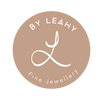By Leahy Sustainability Spotlight
As we all become increasingly aware and supportive of sustainability, it's something that has been on the back of my mind for some time.
A recent conversation led me to reflect on the By Leahy brand. While there is always more that can be done, I realised that there are many sustainable elements to the brand, as seen in its raw materials, production process, and packaging.
Appreciating how important this is for many of my customers, I thought it would be good to highlight a few things that you might like to know more about.

Recycled Precious Metal
When I founded By Leahy in 2019, I used 100% recycled gold. Even though it wasn’t that long ago in the grand scheme of things, I felt at that time, that if I mentioned recycled gold, people would think it was of lesser quality, or not as luxurious as expected. It didn’t stop me from using recycled gold but it did stop me from shouting about it.
Amazingly, in such a short space of time, not only has this become something that people want to hear you shouting about, customers are preferring and proactively seeking out this type of precious metal.
Amazingly, in such a short space of time, not only has this become something that people want to hear you shouting about, customers are preferring and proactively seeking out this type of precious metal.
By Leahy uses 100% recycled gold and 100% recycled silver throughout every product. Both are equal in quality to unrecycled precious metals. As a fine jewellery brand, I exclusively use gold or silver so you can be assured that every item is 100% recycled.
Production Process
In terms of the production process, every item in the collection is handmade in Ireland. This means there is a low carbon footprint involved in the making and distribution of each item. I use An Post to deliver every item to your door. An Post is committed to sustainability and you can read more about it in their Sustainability Report 2022.
From the start, I adopted a 'slow' approach to fine jewellery making - long before a term was coined to describe this sustainable approach. It means I only make pieces to order and I don't respond to seasonal demands for new collections.
My original motivation for choosing this approach was deep-rooted in the brand's purpose – making considered and meaningful pieces to last the generations. My customers seek investment pieces that they can enjoy every day, yet stand the test of time to be handed down to future generations in time. To produce seasonal, or more fashionable, pieces would have been counter to the purpose of the brand.
This conscious approach to jewellery making has the benefit of zero waste as every single item in the collection is made to order and there is no excess supply.

Packaging
A few months ago I re-evaluated the By Leahy packaging, chiefly because I wanted to bring it in line with the brand aesthetic and feel. But it also presented an opportunity to consider the sustainability of all the elements involved.
What goes into the packaging – the gift box, the brand card, the tissue paper, the gift bag, and the postal box – are either made from 100% recycled paper or are FSC® certified. All By Leahy gift boxes are ECO labelled, which serves as an umbrella term for eco-friendly, organic products, recycled products, FSC®-products and Fairtrade® products.
FSC® stands for Forest Stewardship Council® and is an international non-profit labelling system for wood and paper. The boxes are an FSC® certified product / FSC Mix 70%. The FSC® mark guarantees that all materials come from an FSC® forest, where no more wood is cut down than the forest can reproduce. This means better protection of the animal and plant life, and all foresters have proper training, safety equipment and a decent wage.
Fairtrade® is an international labelling system and is about better prices, decent working conditions, local sustainability, and fair terms of trade for farmers and workers in the developing world. By requiring companies to pay sustainable prices (which must never fall lower than the market price), Fairtrade addresses the injustices of conventional trade, which traditionally discriminates against the poorest, weakest producers. It enables them to improve their position and have more control over their lives.
Moreover, Fairtrade has a long list of demands for environmentally-friendly farming and the use of pesticides. Both announced, and unannounced visits are made to ensure that all standards are met. Companies dealing with Fairtrade products are also obliged to comply with the standards of the Fairtrade brand.
Ongoing...
Like many of you, I am continually learning about sustainability – ways in which I can both personally and professionally do my bit to protect nature and our beautiful natural environment. Hopefully, these small steps are helping and I continue to look for new ways to do things as best as I can.
As always, feedback and conversations are most welcome.
As always, feedback and conversations are most welcome.
Laoise x
